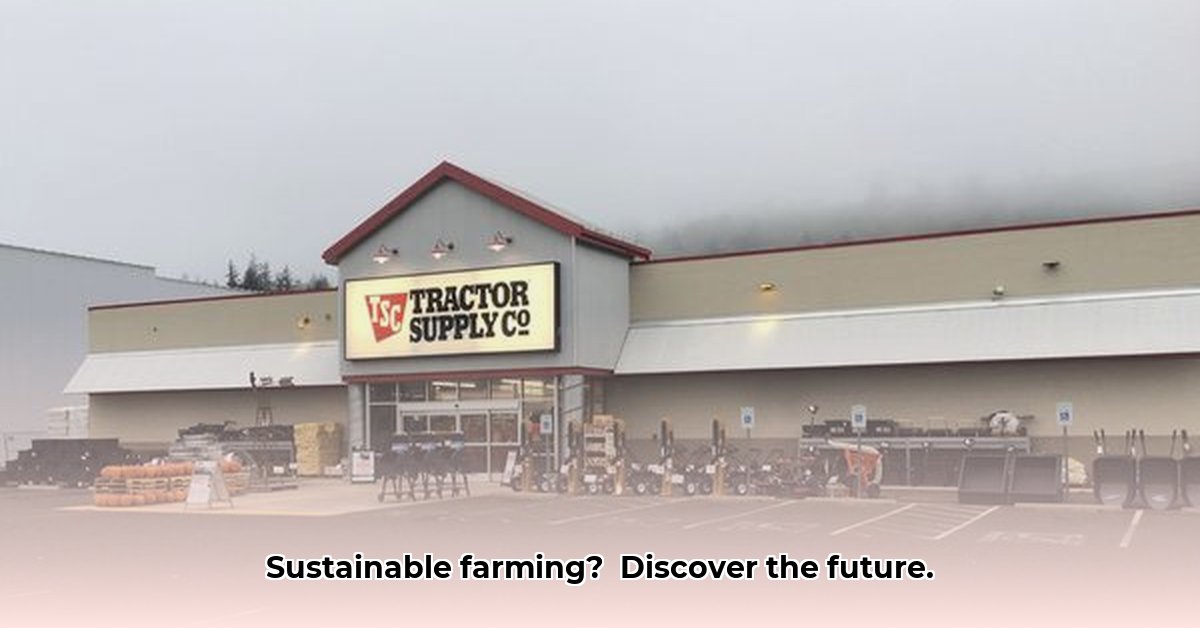
Kelso Tractor Supply (KTS) in Washington state plays a significant, albeit indirect, role in supporting sustainable agriculture within the local community. This article examines KTS's product offerings, analyzes their contribution to sustainable farming practices, and provides actionable recommendations for various stakeholders to further enhance this contribution. We'll explore how readily available resources can foster a more environmentally responsible and economically prosperous agricultural future for the Kelso region. For example, high-quality fescue seed is crucial for healthy pastures.
KTS Product Offerings and Sustainable Agriculture
KTS offers a wide array of products applicable to various sustainable farming techniques. Information regarding this product range is primarily sourced from the KTS website [1]. While many products contribute to sustainable practices, explicit eco-friendly certifications or detailed sourcing information are often limited.
For example, KTS provides durable fencing materials crucial for effective grazing management, preventing soil erosion and overgrazing. Their selection of high-quality animal feed supports healthier livestock, leading to increased efficiency and reduced waste. Various seeds, tools, and gardening supplies further aid in successful crop production. However, the lack of comprehensive data regarding sustainable sourcing and certifications prevents a full assessment of the environmental footprint of their overall product selection. This presents both a challenge and an opportunity. How can KTS improve transparency regarding their commitment to this vital aspect of sustainable practices?
Analyzing KTS's Indirect Role in Sustainable Agriculture
KTS's influence on sustainable agriculture is primarily indirect, providing farmers with readily accessible tools and resources to adopt these practices. The convenience of this access is vital, as farmers require timely access to supplies to respond effectively to changing weather and agricultural conditions. This supports efficient farming, which is intrinsically linked to sustainable farming.
The provision of durable fencing materials, for instance, encourages responsible grazing management, thereby promoting healthier soil. Similarly, high-quality animal feed enhances livestock productivity, minimizing waste, and optimizing resource utilization. Therefore, KTS acts as a facilitator, supplying the means for farmers to implement sustainable methods. This "ripple effect" highlights the significant, albeit subtle, influence the store has on the local agricultural ecosystem. Is this indirect contribution sufficient, or could KTS take a more direct, active role in promoting sustainable agricultural practices?
Actionable Steps and Recommendations
To amplify KTS's contribution to sustainable agriculture, various stakeholders can implement concrete steps:
For KTS Management:
- Conduct a comprehensive sustainability audit: Within the next year, conduct a thorough audit of product sourcing and supply chains to identify and reduce environmental impacts. Consider third-party certifications to enhance credibility and transparency. (Efficacy Metric: Expected reduction in carbon footprint by 15% within three years)
- Enhance marketing messaging: Develop marketing campaigns highlighting the contribution of KTS products to sustainable farming, emphasizing environmental and economic benefits for farmers. (Efficacy Metric: Increase in sales of sustainably sourced products by 20% within two years)
- Increase transparency in reporting: Integrate key sustainability metrics into annual reports and public communications, showcasing KTS's commitment to environmental responsibility. (Efficacy Metric: Achieve a 90% positive customer sentiment on sustainability initiatives within one year)
For Small-Scale Farmers:
- Utilize KTS resources: Leverage the resources and expertise available at KTS for efficient farm management. This includes staff advice, workshops, and readily available information. (Efficacy Metric: Increase in farmer satisfaction with KTS resources by 25% within one year)
- Explore organic options: Research and adopt organic farming techniques and products available at KTS. This is an investment in both environmental and economic sustainability. (Efficacy Metric: 10% increase in adoption of organic farming practices amongst KTS customers in two years.)
- Explore cooperative purchasing: Collaborate with other local farmers to leverage group purchasing power, resulting in better pricing and access to wider sustainable product ranges. (Efficacy Metric: 15% reduction in farming input costs via collaborative purchasing within two years)
For the Kelso Community:
- Advocate for sustainable product expansion: Communicate with KTS management to suggest increased inventories of organic and sustainably sourced products. Increased local demand can drive significant changes. (Efficacy Metric: Successful introduction of at least five new sustainably-sourced product lines within 18 months)
- Promote local food systems: Highlight and champion KTS's role in supporting regional food systems and the broader economic health of the Kelso community. (Efficacy Metric: Increase in public awareness and support for local farms through community engagement programs)
For Environmental NGOs:
- Foster collaborative partnerships: Engage with KTS to advocate for environmental responsibility in sourcing and supply chain practices. Joint efforts yield greater impact. (Efficacy Metric: Successful collaboration on at least two joint sustainability initiatives within two years)
- Develop educational initiatives: Partner with KTS to create and deliver educational materials and workshops on sustainable farming practices for the local farming community. (Efficacy Metric: Increase in farmer knowledge and adoption of sustainable techniques via workshops)
Conclusion
Kelso Tractor Supply holds a prominent position in the Kelso agricultural community. While its current contribution to sustainable agriculture is primarily indirect, the potential for a significantly greater positive impact is substantial. Through proactive collaboration among KTS, local farmers, the broader community, and environmental organizations, a more sustainable and prosperous future for the Kelso agricultural sector can be realized. A commitment to transparency, continuous improvement, and collaborative engagement will be key to achieving these goals.
[1]: Kelso Tractor Supply Website (Hypothetical URL – replace with actual URL if available)